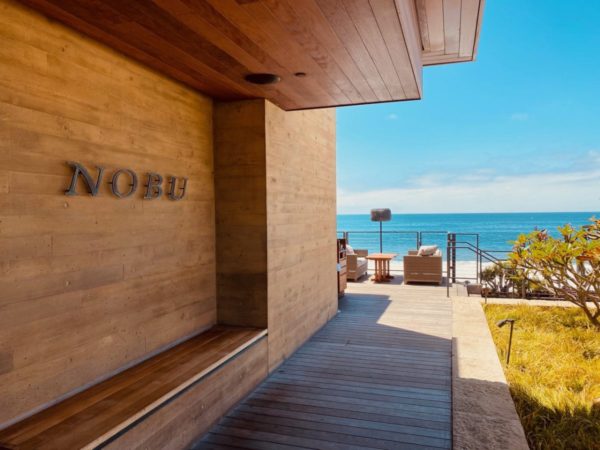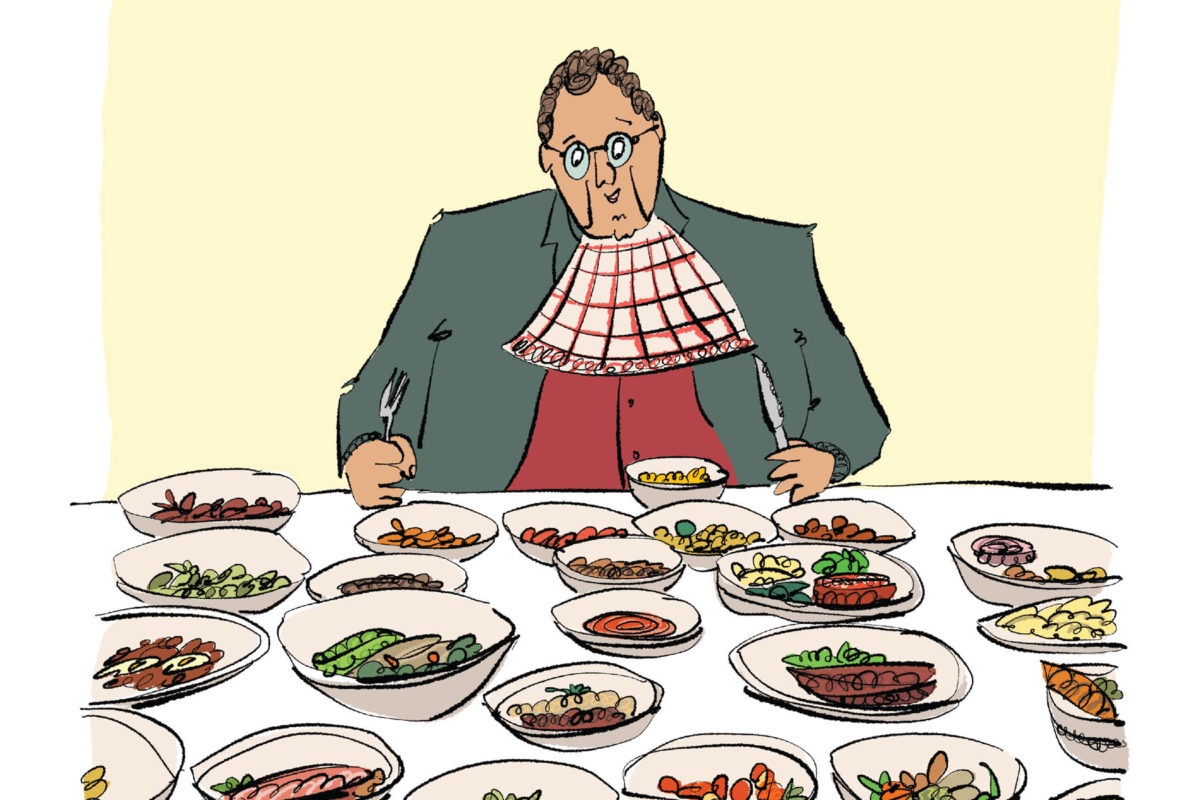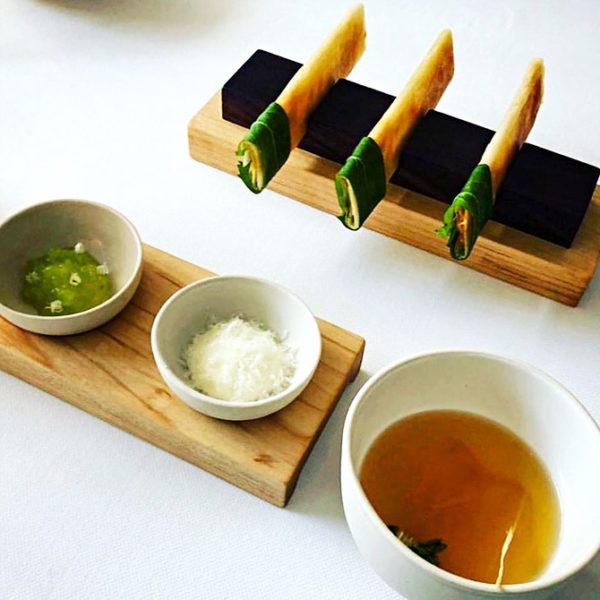If you need a reminder of how easy it is for the restaurant industry to revert to its old, nasty habits, follow Chef Eric Rivera’s Twitter feed. Rivera was recently anointed one of Food & Wine Magazine’s “25 Game Changers” in the restaurant world, but he often behaves more like the game’s umpire. The industry has never given much concern to policing itself, so Rivera’s voice sometimes comes across more combative than it really is. The truth hurts even more when you’re not accustomed to hearing it on a regular basis.
Rivera has been consistently vocal in his criticism of celebrity restaurant owners who rushed to open their dining rooms in the early days of the pandemic. He’s also one of the few chefs that kept his restaurant, Addo in Seattle, closed for dine-in service until vaccines were widely distributed. He acknowledges that his scorched earth approach might burn some bridges, but those bridges were unstable in the first place. “I’d rather end up with nothing and the ability to say everything I want,” he tweeted recently.
Rivera routinely sounds the alarm when big-name chefs that cried poverty at the beginning of the pandemic announce new openings before they’ve even resumed service at the restaurants they closed. He revels in exposing the hypocrisy, but his heart is always with the millions of restaurant workers whose livelihoods are in limbo.
Meanwhile, the food media can’t help itself from swooning over the latest projects, especially ones that are spearheaded by notable white, male chefs. Andrew Carmellini’s Carne Mare, which just opened in New York City on Pier 17 in the Seaport District, is an unapologetic retread of at least three different restaurants that have opened in the last five years—TAK Room, The Grill, and 4 Charles Prime Rib. Is it really possible for critics to praise another chef for his Wedge Salad and one-pound slice of spit-roasted Prime Rib? You bet your rump roast it is.
Instead of going it alone in reviewing Daniel Humm’s $335-a-head tasting menu at the Eleven Madison Park Vegan reboot, Adam Platt of New York Magazine invited a colleague with Vegan sympathies along for his latest review. EMP has been open less than a month and already other prominent restaurant critics like Kate Krader at Bloomberg have filed reviews. Even a global pandemic that’s killed over a half a million Americans cannot stop food media FOMO.
Platt was furloughed for an entire year during lockdown, and, without missing a beat, he’s back to pontificating about high-tone Jalapeño Poppers like the pandemic never happened. He concludes that Humm’s miniature dosas (that look like a bodega display of plastic Bic lighters) were “a brilliant idea.” It’s difficult to tell when he’s being snarky and when he’s being serious. His propensity for othering Veganism impedes his ability to judge the restaurant impartially. “Ask me about some of my most memorable Vegan meals,” he quips to his colleague, Rachel Sugar. When she asks, he pauses and without irony says, “There aren’t any.” This might have been funny before the pandemic, but now when he jokes about eating a whole chicken earlier in the day to prepare for his twelve courses of vegetables, he sounds painfully anachronistic.
Speaking of out-of-touch critics, Steve Cuozzo, the populist food critic for the New York Post, told naysayers to “Eat it And Weep” in a piece where he triumphantly declares rumors of the restaurant industry’s demise greatly exaggerated. He assures us that the industry is alive and well because he can’t get an 8pm reservation at his favorite mediocre midtown Manhattan restaurants anymore. Cuozzo, like many Trump-loving, conservative-leaning Post readers, believes that a return to past glory is what will make the restaurant industry great again. But that also means glossing over the obvious devastation that the pandemic has wrought on so many small businesses in NYC, not to mention the continued exclusion of BIPOC chefs and restaurateurs from sharing the prosperity.
Tejal Rao, one of the few restaurant critics of color to write for a major newspaper in the U.S., surprised readers this past week when she chose to review Nobu in Malibu for the New York Times. Rao covers the food scene in Los Angeles, and, to the dismay of many readers, her byline is considerably less prominent than her colleague Pete Wells. In a city filled with endless culinary traditions, why would the Times editorial staff decide that Nobu, essentially a global chain restaurant, merits this kind of attention?
Even if the restaurant turns out to still be surprisingly good, there have to be more exciting surprises in a city whose foodways have been ignored for so long. When Rao was announced as the West Coast critic, it’s hard to imagine that anyone, including maybe Rao herself, would’ve imagined she’d be wasting her time eating at the L.A. branch of Nobu. Maybe Rao or her colleagues could’ve reported on why the parent company of Nobu took in $28 million dollars in PPP loans in 2020? But perhaps that might have cast a buzz-killing shadow on the picturesque Malibu sunset that Rao found so intoxicating while she was gawking over celebrities and their lookalikes.

Big NYC restaurant groups colonizing other cities isn’t something to celebrate. I made this same argument recently when Helen Rosner used precious New Yorker real estate to dissect the mystique around scoring a Carbone reservation. Carbone is well on its way to becoming the Italian-American Nobu with locations in Hong Kong, Las Vegas, Miami, and another branch soon to open in Dallas. While it’s obvious that many New Yorker readers belong to the proud 1% who faithfully patronize Carbone and its affiliates, ultimately it’s the responsibility of Rosner and her editors to fight the urge to reconstitute the same tired narratives around the status of “getting in” that proliferated before the industry shutdown. The New Yorker only recently added a staff writer dedicated to food and restaurants. In the past, its only coverage of the industry has been through short-form reviews for its Tables For Two column. Using the platform to give “chef bros” more attention is a squandered precious opportunity. Carbone doesn’t need another hype man.
What the industry needs is to start redefining what normal is. It’s lazy to justify writing about these restaurants because affluent readers want to stay informed about the latest projects by big-name chefs and industry trends. The dining public has been inundated with these narratives for so long, they don’t know any better. Most of those storylines are driven by powerful PR firms, and there’s insufficient transparency when it comes to valuable media placement.
The shamefulness of this brand of shilling seems to land differently now. Robb Report just published a glowing write-up in its Food & Drink section of Delilah, a new “Supper Club” in the Wynn Hotel in Las Vegas from “accomplished” executive chef Josh Smith. The writer, Andy Wang, admiringly describes the chef’s whimsical decision to turn a whole roasted chicken into “an upscale version of a TV dinner.” (Insert pain emoji) Wang’s softball approach feels cut-and-pasted from the restaurant’s press release. In case anyone was remotely skeptical of Chef Smith’s prowess, the article quotes another white, male chef to assure us of Smith’s greatness: “He’s just the best fucking all-around chef in Vegas,” James Trees, who runs Esther’s Kitchen and others, tells Wang. (Insert eye roll emoji)
At the end of the day, editors need to be more judicious about which restaurants they assign for review and what narratives they choose to center. If the critics themselves have true autonomy, then it’s up to them to manage the subject matter in a way that leaves behind old methodology. Buzzy new restaurants by big-name celebrity chefs, invariably white and innumerably male, can wait. The latest Keith McNally brasserie or Danny Meyer’s new vegetable-forward concept will be busy no matter what Pete Wells says about it. But it’s irresponsible to continue trotting out the same pre-pandemic storylines as though nothing’s changed in the restaurant industry. It has changed, a lot, and getting back to normal is a giant step backward.



Very thoughtful commentary! I appreciate this critical appraisal.
Sorry, you obviously don’t know me.. I’m james trees. I’m not exactly one to praise people. In fact I’m quite the umpire myself. So, when I say that josh is just the best. That’s a technical cooking and managing assessment. I think your skew on me not being of color or a female is absolutely disgusting. If we can’t recognize someone for 25 years of hard work, then what is our craft about. You obviously have some motive, mine is to see someone who has been busting his ass for decades do well for himself and his family. If your… Read more »
[…] All of this to say that the impermeable male celebrity chef archetype was fabricated long ago. The food media certainly did its part to perpetuate the mythology. At the very least what Ming Tsai’s forgettable performance shows is […]
This guy sucks. He started a vicious campaign against a young woman to get her restaurant shutdown, for no reason. Who wants to support the business of someone who tries to harm others? Horrible person.